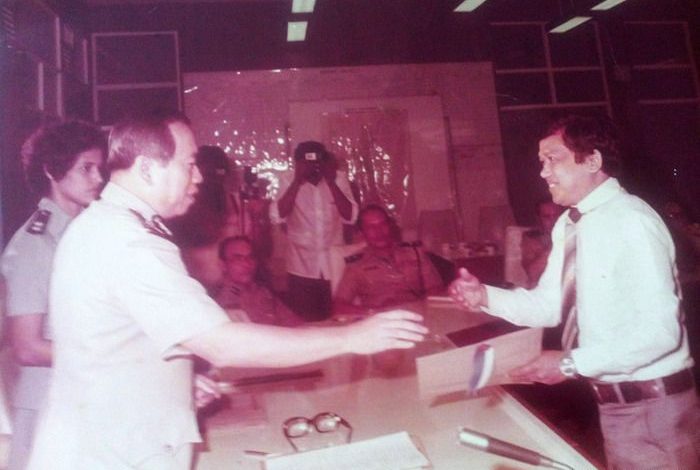A Key Figure against Communist Insurgence in Perak


My Say
By Jerry Francis
The late Tan Sri Yuen Yuet Leng was ‘handpicked’ to be the Chief Police Officer of Perak after his predecessor Tan Sri Koo Chong Kong was assassinated by communist insurgents at the junction of Jalan Hospital and Fair Park in Ipoh at noon on November 13, 1975.
As a dedicated Special Branch officer, he did not hesitate to take on the post knowing full well that his life and that of his family members would be at greater risk.
It was at the height of the ‘Turbulent Years in Perak’ and the communist insurgents had declared they would systematically eliminate those who posed a serious threat to their cause.
Eleven other Special Branch officers were killed by the end of 1976, six of them, all Chinese, were gunned down mercilessly in Perak in the presence of their families. Yuen too had escaped a number of attempts on his life.
The communist insurgents and their underground agents were active in the city and new villages as well as in the jungle. At one stage, an armed group was operating as close as the Keledang Hills, a popular jogging spot on the fringe of the city.


Yuen, who had all through his 34 years career in the Royal Malaysian Police combating communists, took on the challenge as Chief Police Office with full determination.
He was a good choice as he knew Perak well. He had earlier during the 12-year Emergency operated as District Special Branch Officer in the jungles of Grik/Lenggong and Sungai Siput, the hotbed of the communist insurgents.
His first book ‘Operation Ginger’ is about his exploits in the jungle.
His loyalty to King and country was unquestionable. He once wrote that he would continue to maintain “those principles and values I had lived by and was prepared to die for, if necessary.”
His second book, ‘Nation Before Self’, is also a testimony of the principles and values that he as a non-Malay officer had hung onto tightly. He believed that all Malaysians, irrespective of race or religion, have a rightful place in the country.
I was introduced to Yuen soon after he took over at the State police contingent headquarters as I was then actively involved in covering security operations against the communist insurgents throughout Perak and South Thailand.
Yuen maintained a close rapport with the media and at the same time demanded full cooperation from them.
I remember he would angrily threaten to use the Internal Security Act (ISA) against any journalist, who would not co-operate with the security forces and jeopardise ongoing security operations. At the same time, he would show his gratitude to those who had been co-operative.
Towards the end of his successful assignment in Perak and his move to Sarawak as police chief in 1981, he presented Letters of Commendation to a number of journalists. I was one of the recipients for “outstanding co-operation and news coverage”.
During his tour of duty in Perak from February 1976 to February 1981, the police and armed forces had worked closely under the State Security Committee and scored several major successes against the communist insurgents in the state.
In his foreword in ‘Operation Ginger’, former Inspector-General of Police, Tun Moahmmed Hanif bin Omar, described Yuen as one of those involved in the crushing of a revived communist terrorist onslaught which was directed from across the Thai border.
“During our trying emergency years, he had developed and maintained a reputation in the Police Force for indomitable leadership and admirable dedication; ceaseless endeavour and enterprise; and inspiring fortitude at times when lesser hearts would have faltered. He was both a strategist and a bold tactician on whom I depended so much for advice and the execution of plans during the Second Malayan Emergency, 1974-1989,” said Mohammed Hanif.
The two assassins involved in the killing of Yuen’s predecessor, were brought to justice and sentenced to death. Their executions were carried out on March 15,1980.
One of the biggest upset suffered by the Communist Party of Malaya (CPM) was when the entire band of its elite Ninth Armed Workforce of the Fifth Assault Unit surrendered in 1981. The band of 19 insurgents led by their leader, came out of the jungle and handed over their weapons.
After his retirement, Yuen and another former IGP, Tan Sri Rahim Noor, spearheaded the clandestine campaign which led to the 1989 Haadyai Peace Accord in Southern Thailand.
Perak born Yuen, 88, died in his sleep in Kuala Lumpur on October 1, leaving behind his wife Puan Sri Linda Chan Choy May, two daughters and two grandchildren.
He was a teacher before enlisting with the police force in 1950 at the age of 23. “When I enlisted, our objective then was to fight the Communists and our squad comprised Malays, Chinese and Indians,” he once said.
He was awarded the Colonial Police Medal in 1957 for his valour and bravery in infiltrating the communists.
Rest in peace Tan Sri Yuen for you have been a shining example of all dedicated and loyal citizens in Malaysia, irrespective of race and religion.
Your presence at the annual Remembrance Services in Ipoh for members of the security forces and civilians will be greatly missed.


